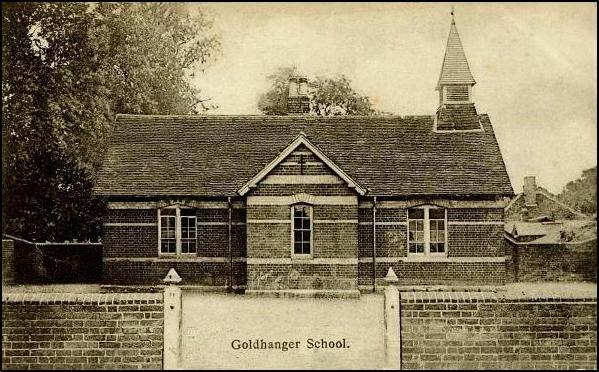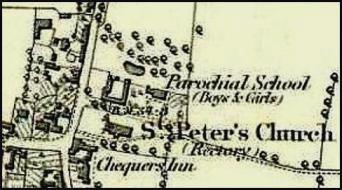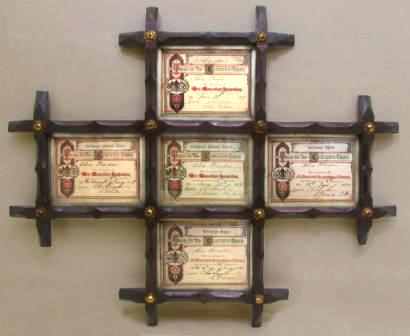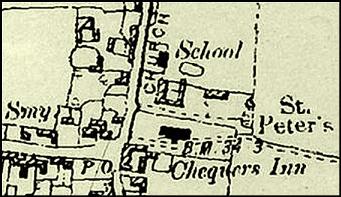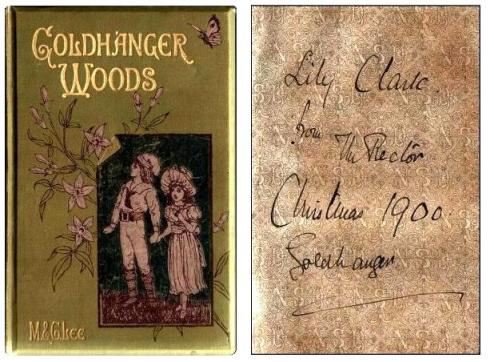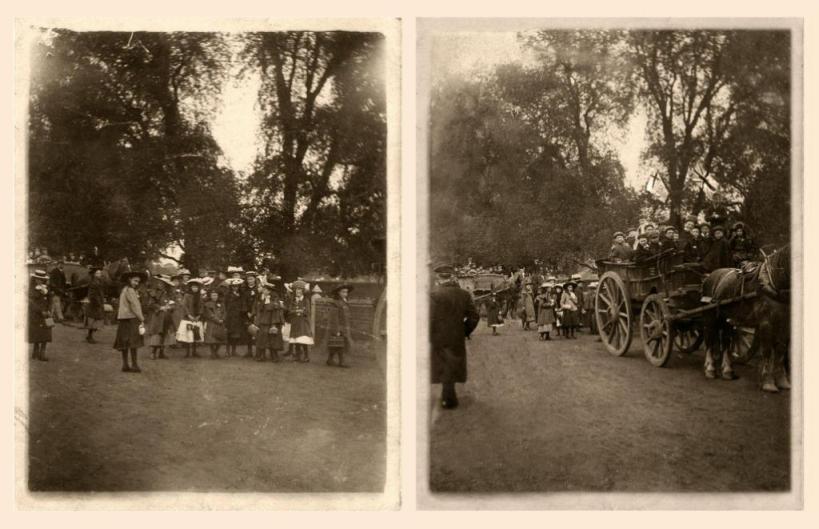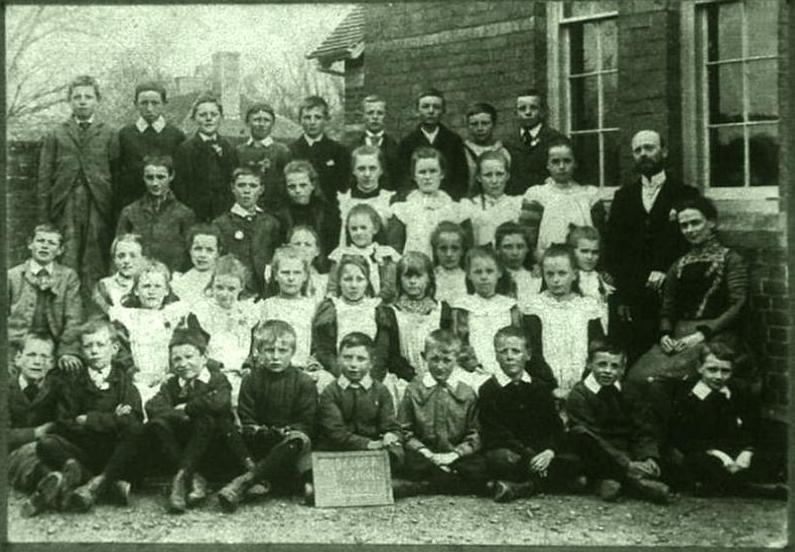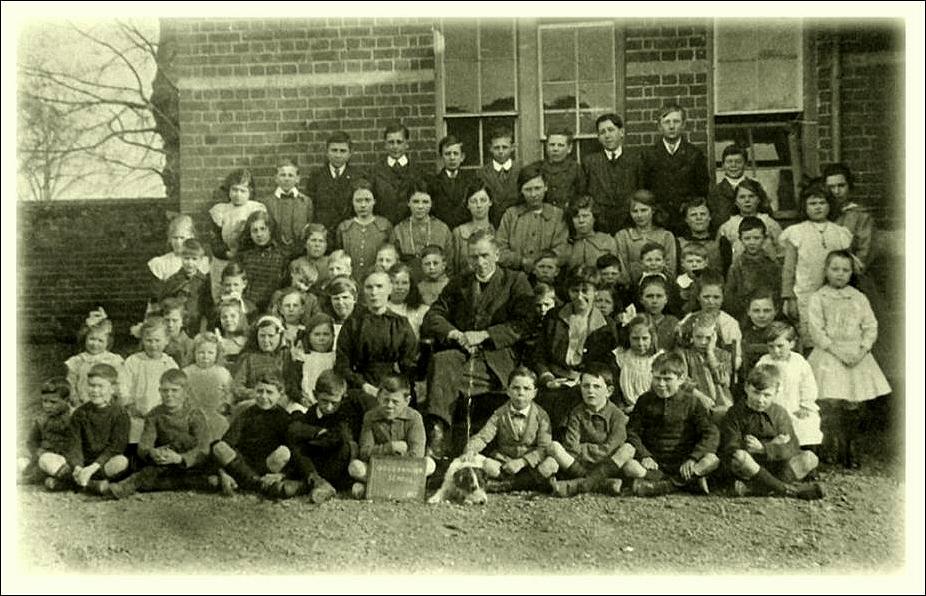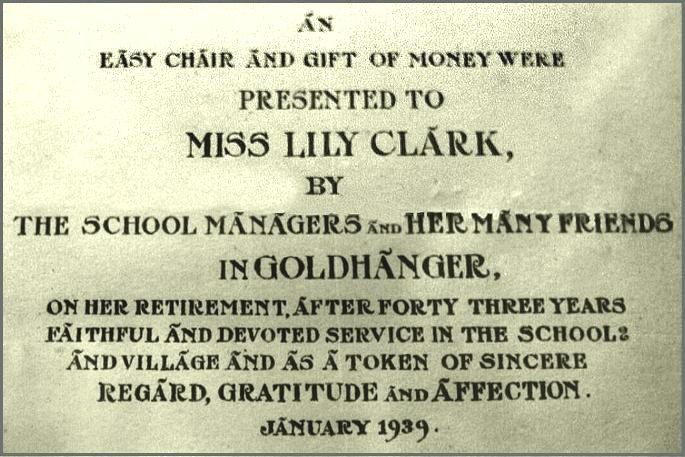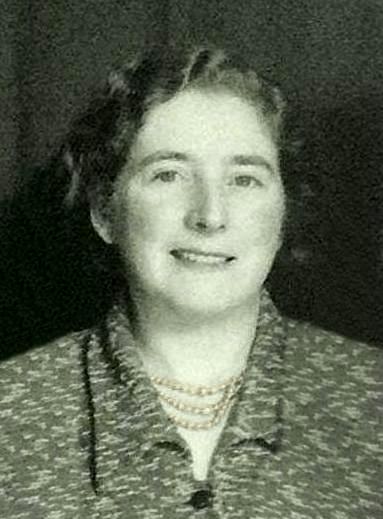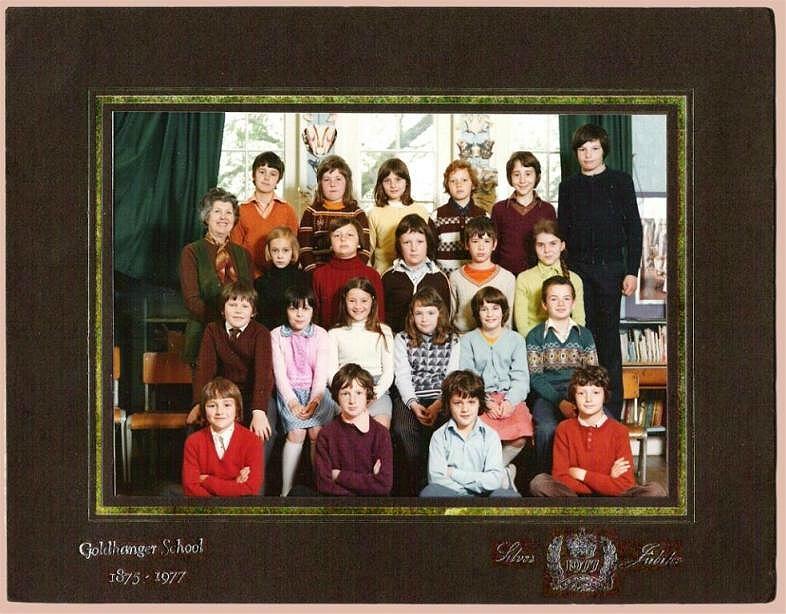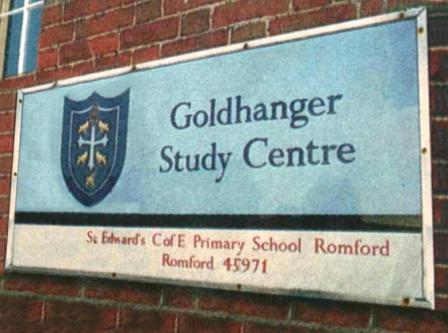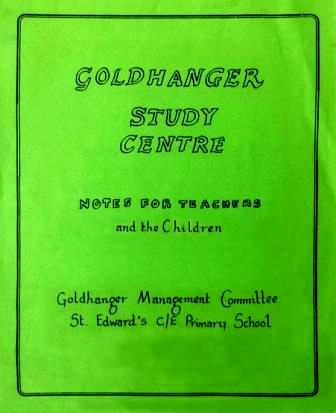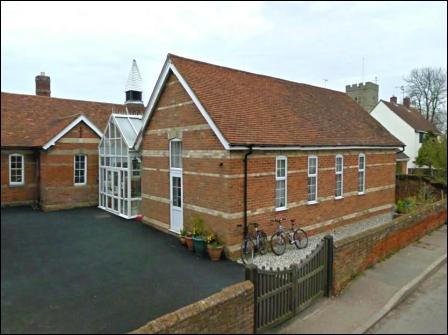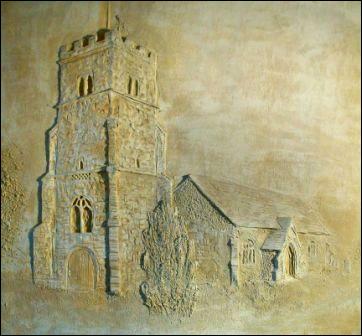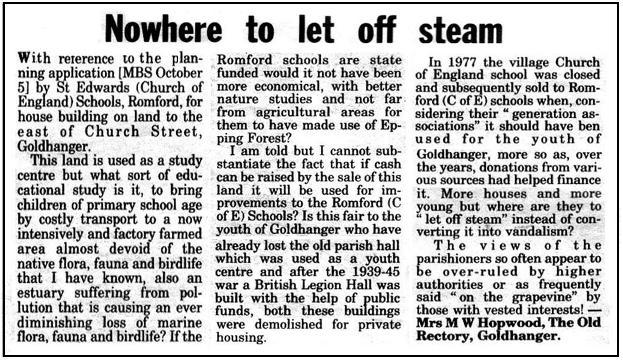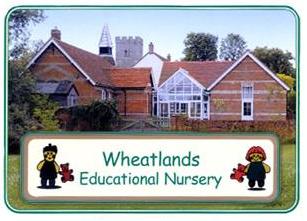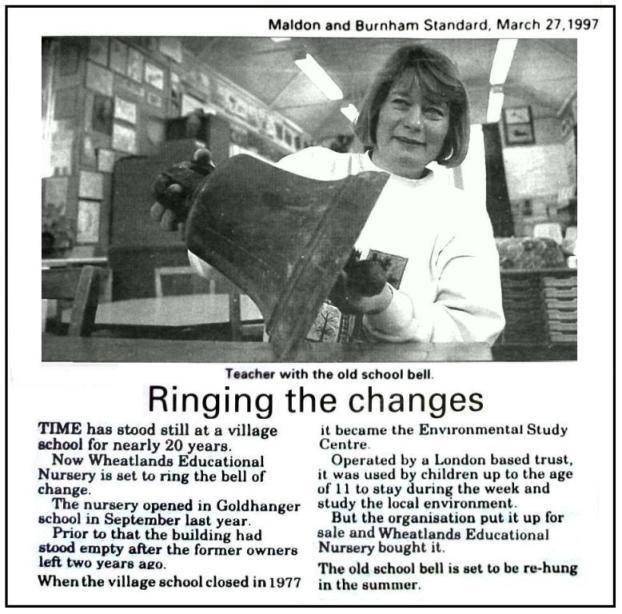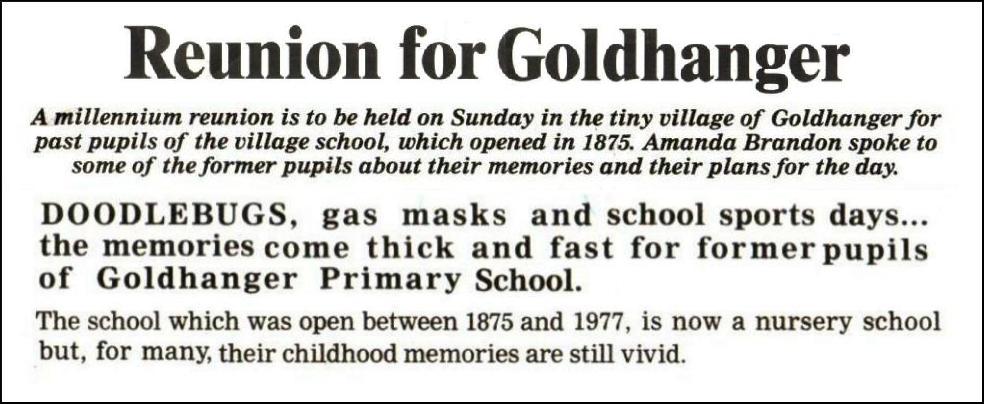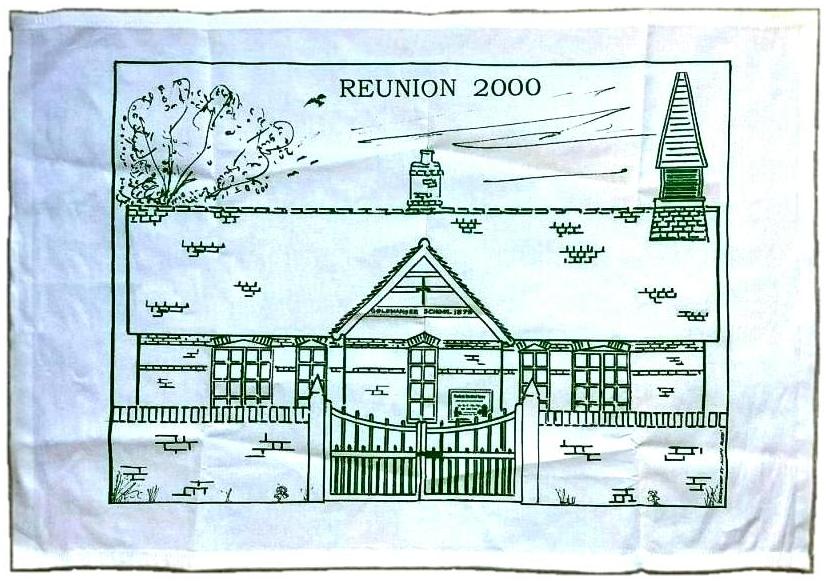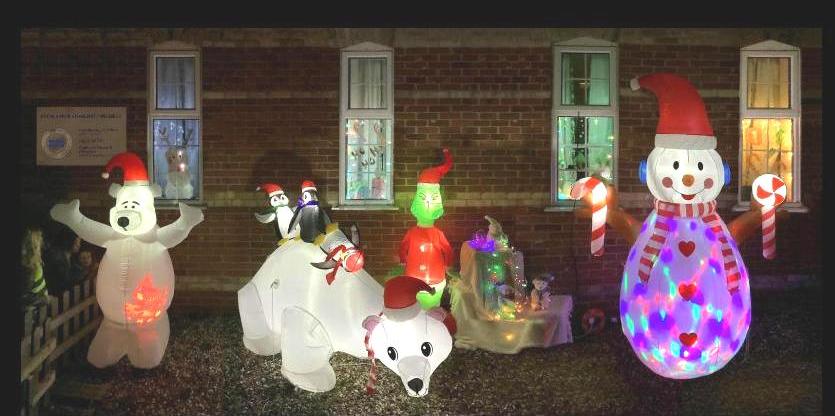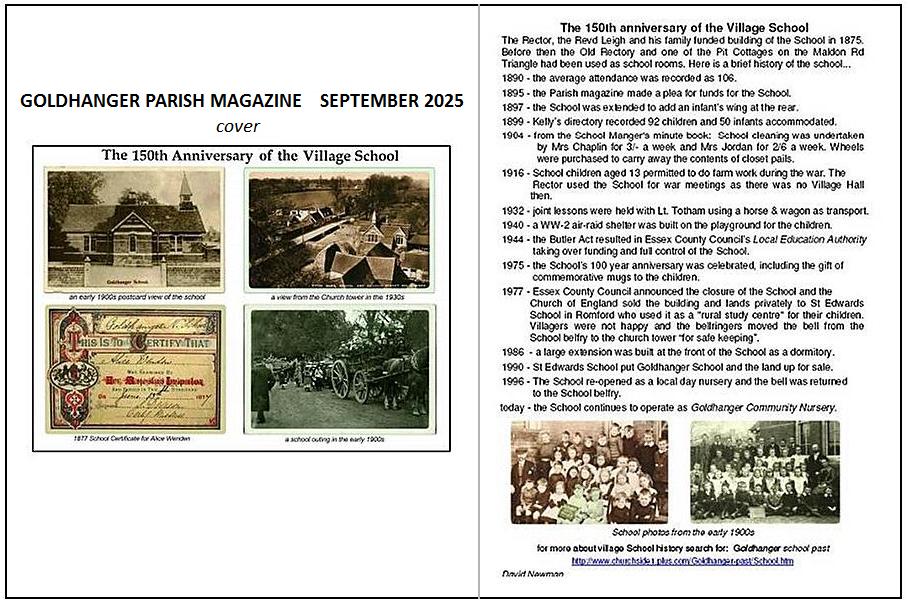|
|
The Village School |
|
|
|||||||||||||||||||||
|
|
original front elevation
select to enlarge south elevation after the 1897 extension |
|
|
|||||||||||||||||||||
|
|
The village school has a long and varied history, beginning with
the first reference to a school in 1602. Between then and when the Revd C B
Leigh built the present building in 1875 the school was located in
several buildings within the village. It ceased to be a state school in 1977,
became a “study centre” for St Edwards school, Romford, and then re-opened as "Wheatlands" day
nursery in 1996. It is now called “Goldhanger Community Nursery”. these are two of the earliest postcard
views of the school on which the above drawing is based... |
|
|
|||||||||||||||||||||
|
|
A 1904 postcard of the school ( many of the more detailed photos on this page can be selected and
enlarged ) |
as seen from the Church tower in the
1920s a hitching post and maypole can be
seen in the play ground |
|
|
||||||||||||||||||||
|
Date |
Event |
|
|
|||||||||||||||||||||
|
1602 |
Earliest
reference to a school in the village Essex court sessions held on 15th April
1602... In Chelmsford on Thursday after the close of
Easter before Thomas Myldmaye & Sir John Petre Knights. Licence granted by the court to
John Knight, Parson of Goldhanger, to convert certain building, which he hath
lately builded at his own charges and upon his free land in Goldhanger, a
school house and to some other habitation, at his humble request. |
|
|
|||||||||||||||||||||
|
1818 |
A
parliamentary committee report refers to 60 boys & girls in the school |
|
|
|||||||||||||||||||||
|
1833 |
Parliament survey shows 4 males
& 11 females attending a fee paying school, probably
in the Coastguard Cottages opposite. |
|
|
|||||||||||||||||||||
|
1839 |
Church vestry and bell tower
room were used as the school |
|
|
|||||||||||||||||||||
|
1850 |
The Pit Cottages on
Maldon Rd triangle were still being used as a school |
|
|
|||||||||||||||||||||
|
1860 |
The Old Rectory was being
used as the "Dame School" |
|
|
|
||||||||||||||||||||
|
1870 |
The school
appears on an early OS maps as a “Parochial School...
|
|
|
|||||||||||||||||||||
|
1875 |
The Revd Leigh’s family
funded building a new school. It may
have been designed by architect Ewan Christian who designed the new
rectory |
|
|
|||||||||||||||||||||
|
1877 |
A high
definition framed school certificates
for Alice Wenden from this year is available here... |
|
|
|||||||||||||||||||||
|
1890 |
Average attendance was recorded
as 106 |
|
|
|||||||||||||||||||||
|
1892 |
Headmaster was Mr Harry Branch |
|
||||||||||||||||||||||
|
1895 |
|
|
||||||||||||||||||||||
|
1890s |
The new school appears on the OS map as
“School”...
|
|
|
|||||||||||||||||||||
|
1896 |
Lily Clark started as assistant
teacher and stayed for 43 years |
|
|
|||||||||||||||||||||
|
1899 |
From Kelly’s directory of
1899... The school was extended in 1897 to add an infant’s wing. |
|
|
|
||||||||||||||||||||
|
1900 |
the Revd. Gardner presented Teacher Lily with a children’s book entitled Goldhanger Woods...
|
|
|
|||||||||||||||||||||
|
1900 |
earliest known photo of pupils with the
caption: “Young Goldhanger” with the headmaster Mr Branch... |
|
|
|||||||||||||||||||||
|
1900 |
A school outing using farm wagons... a high definition version is here... |
|
|
|||||||||||||||||||||
|
1901 |
The school Manger's minute book is
available for this period in ERO |
|
|
|||||||||||||||||||||
|
1903 |
From the School Manger's minute book... The estimated cost of
"warming, lighting and cleaning" the school was estimated at being
£15 per annum. It was also decided to do away with the septic tank and
provide "sanitary pails which shall be emptied 3 times a week" |
|
|
|||||||||||||||||||||
|
1904 |
From the School Manger's minute book... School cleaning was undertaken
by Mrs Chaplin, 3/- a week and Mrs Jordan 2/6 a week. It was decided that
wheels should be purchased to carry away contents of the closet pails."
May Cottis an assistant teacher gained a pay increase from 1/6 to 3/- |
|
|
|||||||||||||||||||||
|
1905 |
From the School Manger's minute
book... Holidays - The school was to be
closed on Bank Holidays as well as Ash Wednesday and Ascension Day. In
addition Mr. Dobson and Mr. Bunting proposed that the school be closed
forthwith for pea picking. Over the years Mr. Dobson set the time for the
summer pea picking holiday which became set as 4 weeks at the end of June and
the beginning of July. In September there was also the annual Blackberry
picking holiday. A number of attempts were made by the local authority to
standardise the times of holidays in the area. These attempt were resisted
strongly by the governors who felt local conditions of the crops should be
taken into account. |
|
|
|||||||||||||||||||||
|
1906 |
“The Old School” building on the Maldon Road
triangle, also known as the Pit Cottages, was
put for sale... |
|
|
|||||||||||||||||||||
|
1906 |
From the School Manger's minute book... There were 4 teachers at the
school. The Headmaster, Mr. Langford, was a long-standing teacher at
Goldhanger as was his wife who looked after the infants. In addition there
were two assistant teachers Miss Lily Clark and Miss May Cottis. Mr Langfords
Salary in 1906 was £124 per annum. |
|
|
|||||||||||||||||||||
|
1906 |
The Headmaster Mr Langford, appears on the right
of this photo with Miss Clark... |
|
|
|||||||||||||||||||||
|
1909 |
From the School Manger's minute book... The school managers were the
Rev. Gardner, the Rev. Durrant Field, Mr. Evitt, Mr. Dobson, Mr. Payne and
Mr. Bunting. As recommended by H.M. Inspectors a gallery was removed from the
Infant room. The cost of this,7/6, was paid for by the county council.
Tenders for the redecoration were asked for. Mr. Mann won the contact. |
|
|
|||||||||||||||||||||
|
1913 |
From the School Manger's minute book... Miss Clark was asked to resign
after 22 years at the school as it was over staffed. This was to everyone's
regret. |
|
|
|||||||||||||||||||||
|
1915 |
- 1919 |
Parish magazine records of the school’s
involvement in WW-1 [find the word “school”
– 19 occurrences] |
|
|
||||||||||||||||||||
|
1916 |
13 year
old school children permitted to do farm work during WW-1 |
|
|
|||||||||||||||||||||
|
1916 |
From the School Manger's minute
book... Ernest
Johnson, a scholar of 13 years of age was granted leave of absence from
school from June until October to work at the rectory, owing to a shortage of
labour occasioned by the war. Mrs Langford after 16 years at Goldhanger died.
Miss Clark was re hired to take her place. |
|
|
|||||||||||||||||||||
|
1919 |
End of
WW-1 celebrations held in the school |
|
|
|||||||||||||||||||||
|
1919 |
From the School Manger's minute
book... Mr.
Langford retired and became one of the school managers. Miss Fielding was
appointed to replace him. |
|
|
|||||||||||||||||||||
|
1920 |
- 1927 |
The
headmistress was Miss Ethel Barnett |
|
|
||||||||||||||||||||
|
1920s |
The Rector, Revd
Gardner is in the centre of this school photo (with his dog)... |
|
|
|||||||||||||||||||||
|
1920 |
school photo taken in the school field... |
|
|
|||||||||||||||||||||
|
1927 |
- 1937 |
The
headmistress was Miss Ault |
|
|
||||||||||||||||||||
|
1930s |
From Cyril Southgate’s Early Goldhanger Memories... Goldhanger School in the late
1930s - The school looked after the
education of the children up to the age of 14. Until I think 1937-1938, when
pupils of 11years old were bussed to Maldon Secondary Schools (separate boys
and girls). I was 11 years old in February 1939 and went to Maldon in September
just as war was declared. During the period of the “phoney war” some pupils
already at Maldon decided to stay in Goldhanger for school, but after a month
or two things got back to normal schooling in Maldon. School days in the 1930s were happy days and we
always looked forward to holidays, especially pea picking holidays in June.
We picked peas by the sackful for the Bunting Brothers of Highams and Joyces
Farms. The local school
children also enjoyed a summer tea party at Joyces Farm in the same
era 1930-1940. Mrs George Bunting (Edith) and Mrs Mabel Speakrman were school
governors for many years. We were transported in wagons along the lower
fields to joyces farm, where we always enjoyed a lovely tea, usually on the
tennis court This was followed by a treasure hunt and various activities. All
these thing fell apart as war loomed in later years. A lovely single lady, Miss Lily
Clark lived next door in Fish Street. She acted as an auxiliary teacher at
the local school. I remember she suffered badly from what I can only now
presume to be arthritis, because at my early age of 3½ years I would remember
her badly disabled fingers. About this time she took me to school, daily
walking up Fish Street. I understand they took me in early at school to give
my mother some relief as my brother was still under 6 months old. The head
teacher at this time was Miss Ault who lived with a companion a Miss Allen,
at the house we now know as “Tayspills”, Church Street, the home of the late
Miss Moira Benham. |
|
|
|||||||||||||||||||||
|
1932 |
Records
indicate that there were still joint lessons with Lt Totham using horse &
wagon transport |
|
|
|||||||||||||||||||||
|
1931 |
Headmistress
Miss Ault produced a Guide to
Goldhanger - 1931 (ERO A9886 –
restricted access, not seen) |
|
|
|||||||||||||||||||||
|
1935 |
Goldhanger reminiscences from a
previous era (late1800s?) in The Essex Chronicle in 1935... Mr. Howard first attended school held in a room
in two cottages. The governess was Mrs. Dennington. Later he went to school
at the Old Rectory where Miss Barlow was the teacher. Sunday school treats,
at which roast beef and plum pudding were served came to mind as he recalled
the past. Scholars took their own plates, knife, fork and jug, and Mr. Samuel
Huxter, the rector's gardener, and Mr. Collins, the butler, assisted at the
gathering. Miss Wenden was a pupil at Miss Stowell's private
school, which used to be held in a cottage nearly opposite the present school.
Alice Bridge, Patty Scowen and Bob Bridge were pupils too. Miss Wenden
attended the Wesleyan Sunday School when Mr. Henry Bevis was superintendent
and Miss Alexander a teacher. |
|
|
|||||||||||||||||||||
|
1935 |
A special school magazine was
produced for the King’s Jubilee... It has 35 pages of descriptions of the village and
poems written by the children in their own handwriting. This high resolution version may be slow to open. |
|
|
|||||||||||||||||||||
|
1939 |
Miss Lily Clark retired after
43 years teaching and was presented with an easy chair and money...
|
|
|
|||||||||||||||||||||
|
1940s |
A former resident and pupil at the school
recalled that on Oak Apple Day, certain nasty village boys used to pick
stinging nettles to lash the backs of girls’ bare legs on their way to
school. It was an old tradition, though it could be done only if the girls
were not carrying an oak apple themselves. The village’s head teacher Mrs
Waring quickly put a stop to it. [Oak Apple Day, or Restoration Day, was once an
English public holiday on 29 May to commemorate the restoration of the
monarchy in 1660. The holiday was abolished in 1859, but retains some significance
in local customs. Celebrations entailed wearing oak apples or sprigs of oak
leaves. Anyone who failed to wear a sprig of oak risked being pelted with
bird's eggs or thrashed with nettles]. |
|
|
|||||||||||||||||||||
|
1941 |
In World War 2 an air-raid shelter was built in the
playground. (see the 1950s photo below) |
|
|
|||||||||||||||||||||
|
1950 |
- 1969 |
Mrs Warin
was the Headmistress for 30 years |
|
|
||||||||||||||||||||
|
1950 |
A sports day parade... |
|
|
|||||||||||||||||||||
|
1950s |
Mrs Marjerie
Randall, wife of the Rector, was a teacher at the school in the 1950s... |
|
|
|
||||||||||||||||||||
|
1950s |
The WW-2 air-raid shelter was still in the playground and being used for
“target pratice”... |
|
|
|||||||||||||||||||||
|
1960 |
This was the period when many
ancient buildings in the village were listed for their historic value,
however the school building was not listed then and
never has been. The usually reason given is that at the time of the listed
designations, buildings that had already had been altered in a way that
detracted from their originality did not qualify for a listed status. For the
school this was a mixed blessing, as listing would have inhibited its further
development, preserving it as it appears at the top on this page, but it would not have
had the useful purposes it has had in recent times. |
|
|
|||||||||||||||||||||
|
1969 |
- 1975 |
The
headmaster was Mr Bob Broadie. Here he is on the left at a sports day
event...
|
|
|
||||||||||||||||||||
|
1975 |
Celebrations of the school’s 100 year
anniversary, including the presentation of commemorative mugs to the
children... |
|
|
|
||||||||||||||||||||
|
1975 |
- 1977 The headmistress was Mrs Violet Owen, she is
on the left in these photos... |
|
|
|||||||||||||||||||||
|
1977 |
School
photographs taken for the Silver
Jubilee celebrations which
was just before the closure of the school was announced |
|
|
|||||||||||||||||||||
|
1977 |
Newspaper
articles announced the closure of the school... Select to enlarge |
|
|
|||||||||||||||||||||
|
1977 |
The Church of England sold the
school building to St Edwards school in Romford. Local people who were
unhappy about the school closure and the sale of the building and moved the school bell from its belfry to the church tower
“for safe keeping”. |
|
|
|||||||||||||||||||||
|
1978 |
The school re-opened as a rural study centre for St Edwards school, Romford |
|
|
|
||||||||||||||||||||
|
1978 |
A 9-page booklet was produced
with information for teachers and students with sketches and descriptions of
the houses down Fish St |
|
||||||||||||||||||||||
|
1986 |
A large dormitory extension was
built for overnight stays for the visiting children... |
|
|
|
||||||||||||||||||||
|
1986 |
Impressive pargetting was
incorporated in the new entrance hall. This is one of a collection of
pargetted local scenes inside the building. Select the image to view others in the collection... |
|
|
|||||||||||||||||||||
|
1989 |
A planning
application for
houses on the school field was opposed by most villagers... select to enlarge
either of these two local newspaper articles ...however the planning application
was finally rejected by Maldon District Council. |
|
|
|||||||||||||||||||||
|
1990s |
St Edwards
in Romford put the Goldhanger school and its land up for sale |
|
|
|||||||||||||||||||||
|
1996 |
The school
re-opened as "Wheatlands" day nursery |
|
|
|||||||||||||||||||||
|
1996 |
The school bell was returned and put back into the school belfry and
for several years was regularly rung at the beginning of the school day. |
|
|
|||||||||||||||||||||
|
2000 |
A re-union
for past pupils was held at the school...
an extract from the Essex Chronicle of June 2000 |
|
|
|||||||||||||||||||||
|
...and a commemorative tea towel was
produced for the event and sold to former pupils and residents.
|
|
|
||||||||||||||||||||||
|
2024 |
The school participated in the
December 2024 village Advent Calendar event... |
|
|
|||||||||||||||||||||
|
2025 |
...was
the 150th anniversary of the building of the village school. There was a history
article in September’s Parish Magazine
in recognition of this... |
|
|
|||||||||||||||||||||
|
2026 |
The school continues to operate as...
The nursery’s facebook group is at... |
|
|
|||||||||||||||||||||
|
|
© The Goldhanger
Digital Archive 2026 |
|
|
|||||||||||||||||||||
|
|
|
|
|
|||||||||||||||||||||
